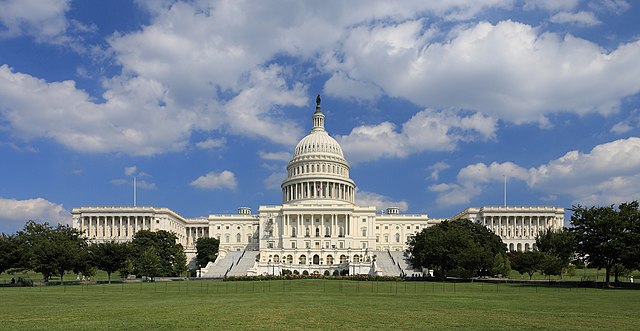 By DR. MIRIAM ACZEL
By DR. MIRIAM ACZEL
After refusing to support the nearly $2 trillion Build Back Better Act last year, Sen. Joe Manchin III (D-WV) has reversed course and signed off on a scaled-down version of the original spending package. Known as the Inflation Reduction Act of 2022, this agreement contains the most ambitious strategy for climate change and clean energy production.
On Wednesday, July 28, Manchin—who is also the Chairman of the Senate Energy and Natural Resources Committee—and Senate Majority Leader Chuck Schumer (D-NY) announced the new budget reconciliation bill that aims to fight inflation, invest in domestic energy production, and lower the costs of healthcare and prescription drugs. In his statement, Manchin said, “[t]he Inflation Reduction Act of 2022 addresses our nation’s energy and climate crisis by adopting commonsense solutions through strategic and historic investments that allow us to decarbonize while ensuring American energy is affordable, reliable, clean and secure.”
The spending proposal must be advanced through the Senate—and quickly, as the Senate is set to take a one-month recess beginning August 6. With the Senate being evenly divided along party lines, Democrats would need full attendance, which is uncertain given the recent surge in COVID-19 cases, including Manchin and Sen. Dick Durbin (D-IL), who have tested positive. Additionally, Sen. Kyrsten Sinema (D-AZ), who previously opposed the “carried interest” provision in the draft legislation (which would close a loophole and increase the tax rate of money managers), hasn’t yet weighed in on whether she will support the act.
At a time when many climate activists and lobbyists had given up hope, this sudden announcement catalyzes the U.S.’ work in the fight against climate change. The bill comes after Machin’s opposition to the previously introduced Build Back Better Act, which included roughly $550 billion over 10 years for climate change and clean energy programs. The Inflation Reduction Act, which Senate Democrats hope to pass next week, is a major breakthrough after over a year of failed negotiations.
President Biden praised the deal, stating “[t]his is the action the American people have been waiting for. This addresses the problems of today–high health care costs and overall inflation—as well as investments in our energy security for the future.”
Key climate provisions in the bill include:
- $9 billion in home energy rebates to help Americans make their homes more energy efficient
- New tax credits of up to $7,500 for the purchase of new electric vehicles, a credit of up to $4,000 for used electric vehicles for lower- and middle-income Americans
- $60 billion in tax credits for manufacturing of green technologies, including heat pumps, solar panels, wind turbines geothermal plants, and batteries
- Implementation of programs to tax emissions of the potent greenhouse gas methane, with the new methane fee starting at $900/ton and quickly rising to $1500/ton
- Tax credits for companies to continue operating zero-carbon nuclear plants
- Tax credits for carbon capture and storage from industrial facilities and natural gas power plants
- $27 billion towards a “green bank” for the deployment of technologies to address the disproportionate burden of pollution on low-income communities and communities of color
- $40 billion in programs to reduce agriculture sector emissions and scale up biofuels
- A 30% microgrid tax credit
Republicans, caught off guard by the deal, oppose the proposed tax increases on large corporations and insist that replacing fossil fuels with wind, solar or other carbon-neutral fuels will damage the economy. Earlier last week, Sen. Lindsey Graham (R-SC) told The New York Times that he doesn’t “want to be lectured about what we need to do to destroy our economy in the name of climate change.” U.S. Senate Republican leader Mitch McConnell (R-KY) has also pushed back against the Build Back Better agenda, calling it “a reckless taxing and spending spree that would hammer American families and the affordable energy they need to power and heat their homes and drive their cars.”
While the details are still being sorted out, one thing is clear—this is welcome news in the fight against climate change, and an opportunity to double down on working towards a cleaner, greener, and more equitable planet.
Summary texts:
- Inflation Reduction Act – One Page Summary
- Tax Summary
- Prescription Drugs Summary
- Energy Security and Climate Change Investments Summary
Cover image credit: Martin Falbisoner/Wikimedia Commons
Editor’s note: this article originally appeared on the EcoBlock blog
Dr. Miriam Aczel is Leaders in Energy’s Director of Scientific Communications. Miriam is a postdoctoral scholar at the California Institute for Energy & Environment (CIEE) based at UC Berkeley, working on the Oakland Ecoblock project. She is also currently an Honorary Research Associate at Imperial College London’s Centre for Environmental Policy, with a focus on international energy science and policy, with a focus on mitigation of environmental and health impacts of shale gas. Miriam earned her PhD at Imperial College London in 2020, where she was a President’s PhD Scholar. She is also co-founder and co-director of the Amir D. Aczel Foundation for Research and Education in Science and Mathematics, a nonprofit based in Cambodia.



Leave a Reply